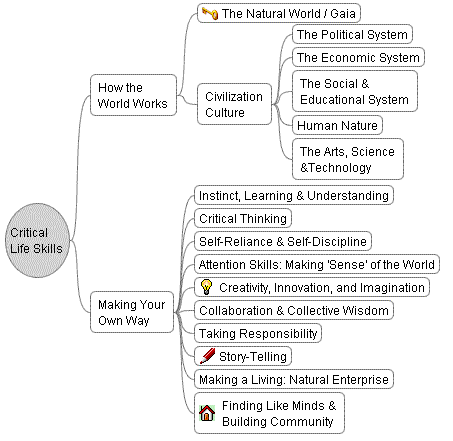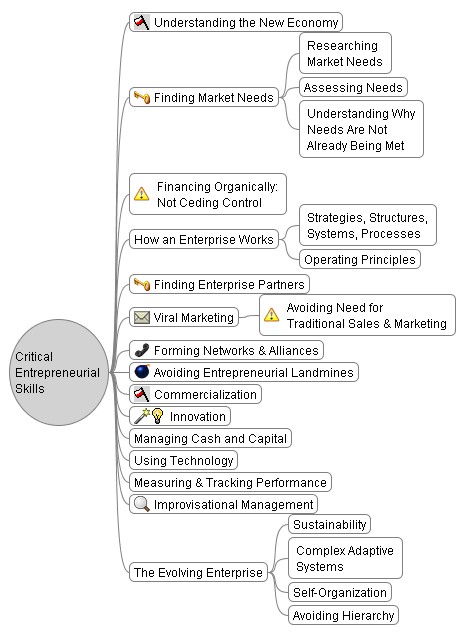 Wednesday I listed the things I want to do, and one of them was “to become better at conversing, presenting and demonstrating”. To that end I’ve been watching videos of great presenters (like Garr Reynolds and Clay Shirky) and reading articles (like Jay Lehr’s Let There Be Stoning for Bad Presenters). A number of truths about good presentations emerge from this:
In order to meet these three criteria, you have to invest considerable time, effort, thought and energy into preparing your presentation, and you must be, as the word ‘presentation’ implies, present. For that to happen you have to really care about your subject and your message. For that reason, at conferences I usually skip presentations made by ‘experts’, politicians and celebrities, since these are often self-aggrandizing, sloppy, and written by others. One of the exercises I’ve set for myself is to craft and practice short ‘elevator pitches‘ on subjects where I am attempting to bring about change. They have two overarching objectives:
It would be nice if they were also persuasive, imparted new information, and were effective enough that people would remember not only my message but also me, thus enhancing my reputation, but these are much less important. All I really want to do is get them to care about the subject, and pass along their new-found passion to others. Just help them get started, as Patti Digh says. This is the essence of viruses: it’s when hundreds and thousands of people start to care about something that they can do something about, that change occurs. The best way to get people to care about something, in my experience, is to show them that you care about it, and why. The key to doing this, in almost every case, is to tell a story. Watch the best TED talks, speeches of change advocates, and even technical talks, and you’ll find most of them answer the two questions above by telling a compelling story enthusiastically, memorably and in a way that provokes further conversation and action. My first exercise is to revamp my bio from a story of what I’ve done to a story about what I care about. First step is to answer the question What do I care about? (that others can do something about). The difficulty I have with this is that most of these things are complex — they’re not easy to explain in an elevator pitch. Some examples:
When I think about trying to prepare a cogent, concise story that conveys why I believe each of these things, and that imagines some ways we could effectively act on them, I despair. These beliefs are the results of years of thoughtful study, research, discussion and reflection. Am I not, as I keep saying, “too far ahead” of most people to ever hope to find a point of connection with them on these very contentious beliefs? Wouldn’t I be better just telling people I believe these things and associating and collaborating with those who are at the same point in their learning and self-discovery journey that I’m at? Maybe, for a start, it’s sufficient that when people ask me to say something about myself, who I am or what I do, I reply instead by saying that what I do is driven by the four profound, controversial, considered beliefs above, and that these are the things I really care about. And when I’m asked for my bio, I do the same: Instead of trotting out my work experience and credentials, I tell them that once I learned enough about what is really happening in the world, I had to stop living my comfortable, acquisitive life and start to take action on these four core beliefs. But, beyond that, I’m going to try to write an elevator pitch on each of the four issues above, a pitch that meets the two criteria above, that actually impels my audience to at least consider the validity of these beliefs and to think about how they might act if these beliefs are valid. You’ll read these pitches here first, and I’ll be looking for you to help me hone them into the core of great presentations. I’d be interested, in the meantime, about what you care about that others might be able to act on, and how you have conveyed your passion for these causes and beliefs effectively to others. Category: Communication & Story-Telling
|






About good presentations, specifically “Good presentations are dynamic, enthralling, and provocative.”In my work as an elementary school counselor who, over my career, was called on more and more to do classroom presentations, I found that your point here applies strongly to work with audiences of children!I found that these two things especially helped keep them engaged:Interaction – Whenever I could have a point I wanted to make emerge through give and take, conversation, Q and A, I did that.Humor – Used sparingly, and, most often, with relevance to the subject matter, it was an attention-keeper. But you have to be careful with this one – young children will literally fall out of their seats laughing if you overdo it!
Upping the StakesForget Shorter ShowersWOULD ANY SANE PERSON think dumpster diving would have stopped Hitler, or that composting would have ended slavery or brought about the eight-hour workday, or that chopping wood and carrying water would have gotten people out of Tsarist prisons, or that dancing naked around a fire would have helped put in place the Voting Rights Act of 1957 or the Civil Rights Act of 1964? Then why now, with all the world at stake, do so many people retreat into these entirely personal
If you want more people to come to your party, throw a better party.If you want people to change their habits, provide more value and lower cost than their current approach.An economic boom re-tooled communications infrastructure when Bell’s century old analog network was exposed to free market innovation after 1984. De-monopolizing government monopoly over highway design and power grid design will allow small businesses to innovate radical improvements in transportation and power generation. For instance, JPods operate at 200 vehicle-miles per gallon; but require building ultra-light rail networks.
What do I care about? I care about living my life as a human being to its fullest potential. That means feeling content, joy and peace everyday if possible. It also means giving away my wisdom and findings to others so they may experience the same thing. Not an easy task!
Let’s be absolutely clear here; knowledge is power. The more knowledge I acquire about the activities of multinationals, the more convinced I become that they need to be moderated and I will do whatever I can to bring about that change. Hitler needed ignorant people to do his bidding. As soon as the ignorant become knowledgeable, their behaviour changes. Think about it, if you knew a tsunami was on its way, would you stay or run?
T-shirts: “Civilization is History — What do you want to do now?” “School is Out, Learning is In”Elevator chit-chat: “Don’t you love elevators? We had better enjoy them while we still have them!” “Third Floor, please. I’m going to continue my education there.”Perfect pitch: I don’t have that!
Thank you for mentioning Garr Reynolds in your post. I work for Peachpit Press and thought you and your readers might be interested in knowing that he just released his first online streaming video, Presentation Zen: The Video, where he expands on the ideas presented in his book and blog. The DVD is now available for purchase as well. More info can be found here:http://su.pr/6N0VlM